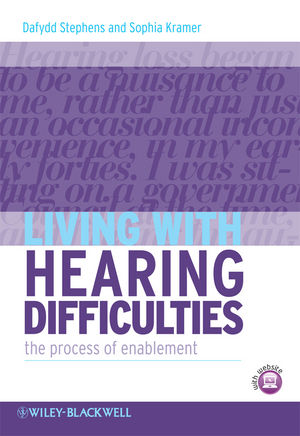Living with Hearing Difficulties: The process of enablementISBN: 978-0-470-01985-6
Paperback
256 pages
October 2009
 This is a Print-on-Demand title. It will be printed specifically to fill your order. Please allow an additional 10-15 days delivery time. The book is not returnable.
|
||||||
Foreword viii
Preface x
Acknowledgements xiii
1 Introduction 1
The need for this book 1
Terminology 2
Layout of the book 4
The World Health Organization classifications 5
Theoretical/management models in the general rehabilitation literature 8
Models of audiological enablement 11
The Goldstein–Stephens model 13
The role of positive experiences associated with hearing impairment 19
Relevant measures in assessing patients’ needs and the outcomes of interventions 21
Development of a preliminary model appropriate to hearing impairment 24
Conclusion 25
2 Seeking help 26
Introduction 26
Becoming aware of hearing difficulties 27
The decision to seek help 31
Referral for hearing help 36
Ethics/philosophy of adult screening 38
Conclusion 42
3 Types of hearing impairment and their consequences 43
Introduction 43
Basic anatomy and physiology and their implications 43
Purposes and process of assessment 47
Types of hearing impairment and their consequences 50
Severity of hearing impairment 54
Unilateral/asymmetrical hearing impairment 55
Age of onset 55
Genetic issues 57
Progressive/sudden onset 58
Conclusion 58
4 The influence of other factors on assessment and goals of enablement 60
Introduction 60
Auditory symptoms 60
General aural symptoms 63
Vision 66
Cognitive and intellectual factors 67
Neuromusculoskeletal problems 68
Conclusion 69
5 Communication 71
Introduction 71
Ecological audiology 71
Ramsdell’s classification 73
Attitudes of the Deaf 81
Conclusion 82
6 Social and emotional aspects of hearing impairment 83
Introduction 83
Participation in life 83
Psychosocial dysfunction 84
Psychosocial consequences of Deafness 90
Demographic factors 91
Conclusion 94
7 Hearing impairment in the family 96
Introduction 96
Impact of hearing impairment on significant others 96
Coping strategies 98
Inclusion of significant others in enablement programmes 100
Hearing impairment arising from genetic causes or with a familial basis 100
Impact of having a family history of hearing impairment 102
Discussion 107
Conclusion 108
8 The process of enablement at work 109
Introduction 109
Statistics 109
Impact of hearing impairment on occupational performance 110
Impact of work-related hearing impairment on significant others 113
Vocational enablement 114
Vocational Enablement Protocol (VEP) 115
Discussion 120
Conclusion 121
9 Leisure and the wider social environment 122
Introduction 122
Prevalence 122
Solitary versus interactive pastimes 123
The role of leisure 123
Opportunities for entertainment and leisure 124
Community life 125
Recreation and leisure 126
Religion and spirituality 131
Human rights, political life and citizenship 132
Conclusion 133
10 The process of enablement 1: Evaluation and decision-making 134
Introduction 134
The evaluation process 134
Integration and decision-making 156
Conclusion 159
11 The process of enablement 2: Short-term remediation 160
Introduction 160
Instrumentation 160
Strategy 174
Ancillary help 178
Conclusion 180
12 Enablement 3: Ongoing remediation and outcome assessment 181
Ongoing remediation 181
Effectiveness of group programmes 194
Outcome assessment 196
Conclusion 201
13 Overall conclusions 202
Appendix: Longitudinal changes in enablement needs of older people with hearing impairment by Louise Hickson 205
References 209
Index 237



